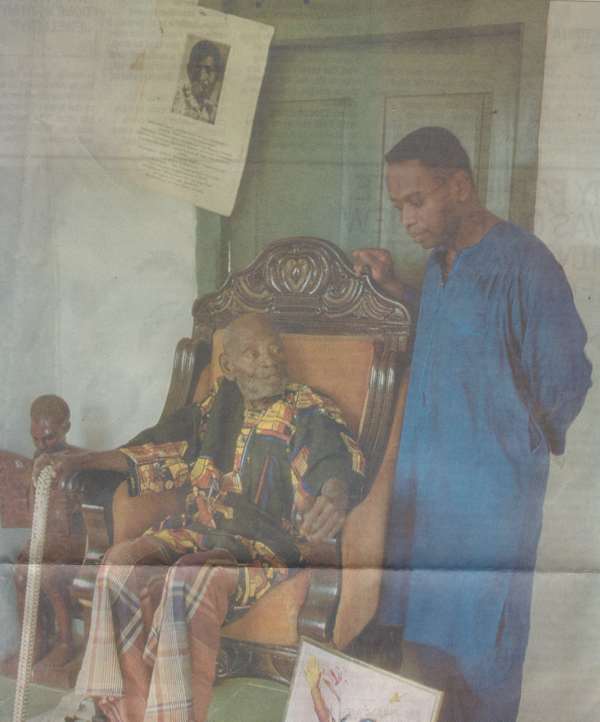
DECEMBER 2005

Ken Wiwa with his grandfather; PascalMaitre/Cosmos
Remembering
Ken Saro-Wiwa
Ogonis still mourning 10 years on
By Sola Odunfa
Excerpts:BBC News, Ogoniland, Nigeria
The Ogoni people of the Niger Delta are still as confident, proud and strong as left them 10 years ago but they have little to smile about on the anniversary of his tragic death.
Their youths roam idly about their peaceful oil-rich land with no hope of employment, and their schools and hospitals are but a shambles.
"People are crying in Ogoniland," says Mrs Charity Baranuaka, a nursery school owner in the Ogoniland town of Bori - an hour's drive away from Port Harcourt city.
"There is no employment, there are no companies. If the companies return, all of us will be very happy. That time I will feed well."
A week-long series of activities has been held to commemorate the 10th anniversary of the execution of Ken Saro-Wiwa - a poet, environmental activist and leader of the Movement for the Survival of Ogoni People (Mosop).
in the past six years of civilian rule, the Nigerian government has made conscious efforts to transform the ugly face of Ogoniland.
A network of good roads has been built across the area, giving it a face-lift no visitor will fail to notice.
Chief Fred Gbakor, chairman of Gokana Local Government Council, says that in comparison to a decade ago "the difference is very remarkable".
Health risk
Perhaps the most important infrastructural development in Ogoniland is the provision of electricity.
A gas turbine located in Eleme, just outside the city of Port Harcourt, supplies power free of charge to the entire area.
The plant was built by the Rivers State government and was commissioned by President Olusegun Obasanjo in 2001.
However, the good news ends there.
There is no supply of drinking water in any part of Ogoniland.
People here depend on streams and rivers for their water needs - at a great risk to their health and well-being.
Those who can afford it sink boreholes and generously share the water with their neighbours.
Anger
Education is a major industry in Ogoniland.
Most young Ogonis now go to at least primary school but most school buildings are in a very poor state.
"Our school buildings are not well-built. Any time there is rainfall we get wet," a secondary school-boy in Bori told the BBC. "The government should help us roof the buildings and make them good".
However, the people of Ogoniland are not blaming the government for all the shortcomings of the social services.
They still look back with anger at the neglect their area suffered from the multinational companies which were exploiting the crude oil resources in the area.
"When I came here I kept looking [in the records] for the involvement of the multinational companies in the educational development of the state," says Barineme Beke, Rector of Rivers State Polytechnic.
"I've not seen any. I don't know why it's been so bad... This is a very sad story."
There are several public hospitals spread throughout Ogoniland but there are not enough doctors to staff them.
The only employers of labour in the area are local government councils, which can only take on a few people each.
Today there is not a single company operating in the area.
There is nothing on the ground to show any positive contribution made by the oil multinationals to the development of Ogoniland during all their years of operation there, which was the justification for the protests of a decade ago.
So 10 years after his execution, Ken Saro-Wiwa continues to loom large in the consciousness of the people.
"Ken died as a martyr. What he said is exactly what is happening today and his ideas continue to live on," says Chief Gbakor.
"He made Ogoni known. Wherever you go today you
can beat your chest and tell people: 'I'm an Ogoni man'
so he liberated us as a people," says Chief John
Bazia, a member of the River State House of Assembly.
While commemorating the 10th anniversary of the execution
of Saro-Wiwa and his eight comrades, they have also been
celebrating the lives of all the other Ogoni men and
women who died during what they describe as "the
Ogoni struggle".